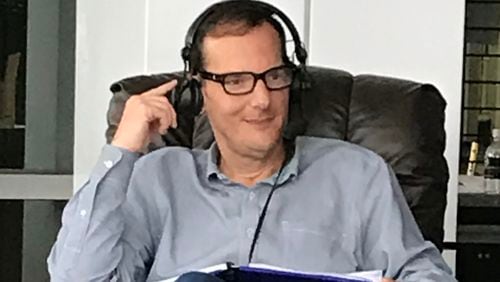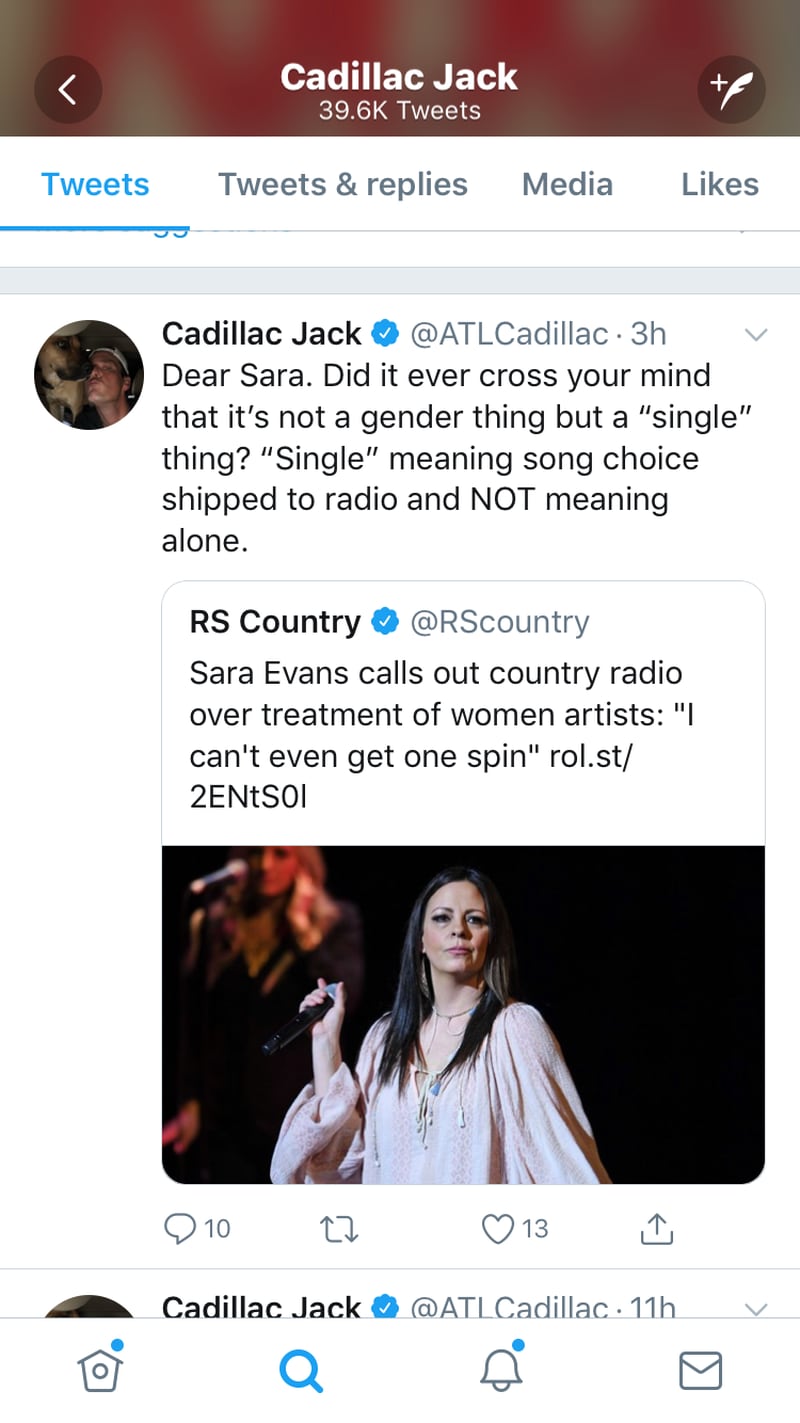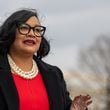Originally posted Sunday, October 28, 2018 by RODNEY HO/rho@ajc.com on his AJC Radio & TV Talk blog
Country radio has been criticized for years for not providing enough airplay for female artists.
So it wasn't a surprise when Sara Evans, who had 11 top 10 Billboard country hits from 1998 to 2010 including "Suds in the Bucket" and a "A Little Bit Stronger," complained on Twitter recently that there has been "blatant stonewalling" of female singers.
“One day I’m a country artist with hits on country radio and the next, I can’t even get one spin on ANY of my new music,” she wrote. She also complained of a relative lack of “creativity and lyrical sophistication” on current country radio today.
Cadillac Jack, Kicks 101.5 morning host who has spent 25 years in Atlanta country radio largely at Kicks, on Twitter this week clapped back at Evans and others who were complaining.
“Dear Sara,” he wrote. “Did it ever cross your mind that it’s not a gender thing but a ‘single’ thing? “Single” meaning song choice shipped to radio and NOT meaning alone.”
When a journalist Marissa R. Moss ( who wrote an investigative piece earlier this year for Rolling Stone about sexual misconduct in the country music business) thought he was implying women's work wasn't up to par, he responded, "Please stop. Re read the tweet. It was not a generalization. You should know better. Were you the author?"
She responded back: "Please 'stop' what? your tweet was unclear. and no, i did not write the tweet. did you have a part in the playlist on your station's site that only has one solo woman on it?" [Caddy does not. Brian Thomas runs his station.]
When Jessica Murski posted the top 20 most played current songs on Kicks 101.5 and noted that Maren Morris was the only woman represented, Caddy wrote: "Maren has a hit. She's had several and has become one of the faces of our format. What happens the day that there is only 1 male in the top 30? Do men march on Nashville? Spam radio? Get a male only Artists of the Year show on @CMT?"
[The current Kicks top 20 now includes Sugarland’s “Babe” featuring Taylor Swift as well as “Rich” by Morris.]
Cadillac Jack (real name: William Choate) did not respond to a text requesting follow-up comment.
Evans earlier in the week attended the CMT all-women Artists of the Year event created by CMT VP of music strategy and former 99X guru Leslie Fram to help give female artists a greater exposure in the business.
On the red carpet, Evans said it’s been painful for her family to see “sobbing at home because [radio] refused to play the single I released when I’ve worked my ass off and gone to visit every country programmer in America.” She released an independent album in 2017 where every song had at least one female composer but radio ignored her single “Marquee Sign.”
Women have never gotten close to gender parity on country radio. I checked the Billboard top 60 country singles of the year from 2002 to 2017 and used Mediabase 24/7 airplay to check year-to-date singles airplay for 2018.
The number of female artists represented each year ranged from 8 to 17 over that span of 16 years (that's 13 to 28 percent). The most consistent period was from 2004 to 2013 when women averaged 12 to 17 singles, a time when acts like Taylor Swift, Sugarland and Miranda Lambert thrived.
But as "bro country" began dominating the airwaves, women had a tougher time breaking in. Over the past five years, women have been heard on just 16 percent of the top 60 singles and that includes songs where women are "featured" duet artists with male leads or were part of mixed-gender groups such as Lady Antebellum and Little Big Town.
Pure solo artists are now even scarcer. The current 40 most played songs to date this year on country radio, according to Mediabase 24/7, features not a single solo female single. Bebe Rexha has the most popular female-led hit with "Meant to Be," but it also features Florida-Georgia Line. The top true solo hit is Kelsea Ballerini's "Legends" at No. 42.
In 2015, radio consultant Keith Hill compared female country artists to tomatoes in a salad in what folks in the industry dubbed "Tomato-Gate."
"If you want to make ratings in country radio, take females out," he said at the time. "I play great female records... they're just not the lettuce in our salad. The lettuce is Luke Bryan and Blake Shelton, Keith Urban and artists like that. The tomatoes of our salad are the females."
While that generated plenty of discussion in Nashville, it didn’t fundamentally change anything on radio.
Carrie Underwood recently addressed the dilemma on a "Women Want to Hear Women' podcast, noting that it's "BS" that there is this idea that female country listeners don't want to hear female singers. She also doesn't think buy the argument that it's simply the "best song wins."
"Even when I was growing up, I wished there was more women on the radio — and I had a lot more than there are today," Underwood said. "I think about all the little girls that are sitting at home saying, 'I want to be a country music singer.' What do you tell them, you know? What do you do? How do you look at them and say, 'Well, just work hard, sweetie, and you can do it' when that's probably not the case right now?"
It is a bit unfair to just pinpoint country music. This is a problem across the board in multiple genres.
A USC Annenberg Inclusion Initiative report“Inclusion in the Recording Studio?” found only 22.4 percent of performers among 600 popular songs across formats from 2012 to 2017 were female. And last year, females represented just 16.8 percent of popular artists on the top charts.
Fram in 2014 was one of three founders of a group called Change the Conversation, which fights inequality in the music business.
“It’s hard on both sides not to get defensive,” Fram said in a text, when asked about Cadillac’s texts. “We just all need to talk about this issue and the consequences of losing female voices for the next generation... We have dug ourselves in a hole and it’s going to take a concerted effort to get out of it.”
Kellie Pickler’s first single was in 2007. Perhaps she’s due for another go?
— WOMAN Nashville (@women_want_more) October 27, 2018
Also, the number of artists who have had a DJ play their single while they’re in studio and never again is pretty much ALL of them. Women get played around 10% and most do promo tours. pic.twitter.com/Q2UJugg8tx
About the Author








